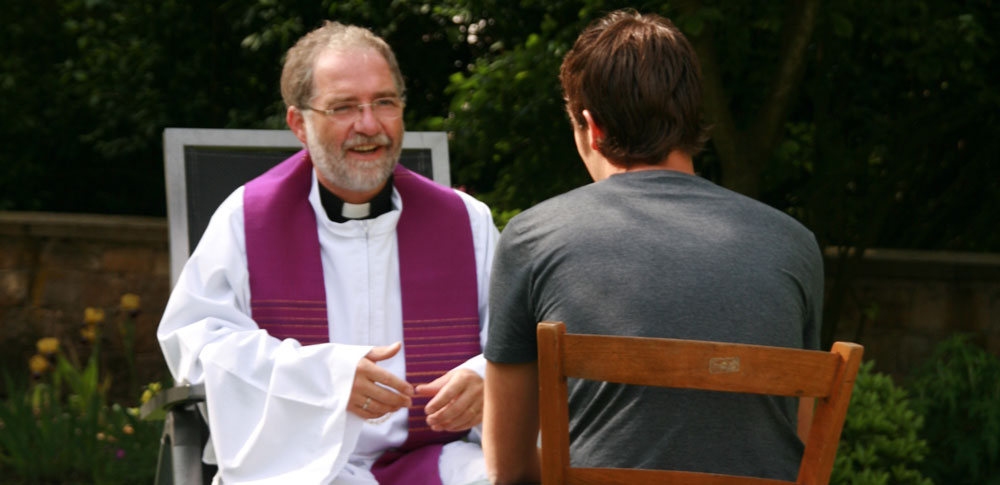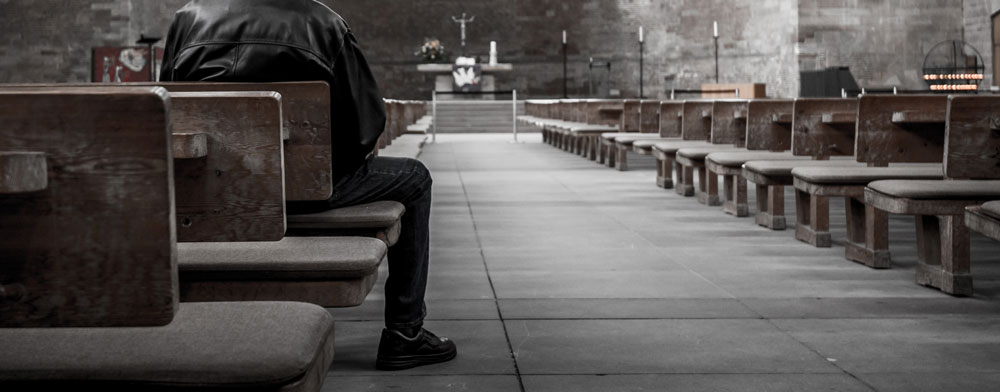
Going to confession is sometimes one of those things that people find themselves avoiding.
This is especially true when we find ourselves needing it even more.
But when we look at what confession really is and why Jesus gave this gift to his Church, we can see it as truly a beautiful sacrament.
Instead of avoiding confession, we will find ourselves desiring to go to confession.
During the Sacrament of Reconciliation, we are reconciled with God. We will find ourselves actually healed and strengthened by it.
As humans, we are body and soul. Our bodies are physical but we are also spiritual. When our bodies are sick, we see a doctor for healing.
When we are spiritually sick through sin, we see a priest for healing in the same way. Through confession, it is Jesus forgiving our sins through the priest.
So it is through confession that we are restored in the divine life.
Confession is one of the names for the Sacrament of Reconciliation. It is one of the gifts that Jesus gave to His Church for the forgiveness of sins.
When we sin, we turn our backs on God. Confession reconciles and restores our relationship with God.
We are all sinners and are all in need of forgiveness. That’s where this sacrament comes in.
So how do we go about making a confession of our sins? How do we make a good confession to bring about spiritual healing and reconciliation with our Creator?
God is waiting for us in that confessional to return to him so he can restore us in our divine life.
The Key to a Good Confession
The key to a good confession is thorough preparation beforehand.
A majority of a good confession takes place before we even step foot into the confessional (the area in which the confession takes place).
The more we reflect and call to mind our short fallings ahead of time, the better the confession will be.
First of all, what makes a good confession?
Three things must take place for the sacrament of Reconciliation:
- The person must be truly sorry for their sins
- The person must confess their sins
- The person must do penance
As the Catechism of the Catholic Church states,
“Penance requires . . . the sinner to endure all things willingly, be contrite of heart, confess with the lips, and practice complete humility and fruitful satisfaction.” CCC 1450
For a good confession, Jesus calls us to have an interior conversion of the heart. Without the interior conversion, the rest of our penance means nothing.
“Return to me with your whole heart, with fasting, weeping, and mourning. Rend your hearts, not your garments, and return to the LORD, your God, For he is gracious and merciful, slow to anger, abounding in steadfast love, and relenting in punishment.” – Joel 2:12-13
The Catechism of the Catholic Church explains interior conversion in this way:
“Interior repentance is a radical reorientation of our whole life, a return, a conversion to God with all our heart, an end of sin, a turning away from evil, with repugnance toward the evil actions we have committed. At the same time, it entails the desire and resolution to change one’s life, with hope in God’s mercy and trust in the help of his grace.” CCC 1431
Preparation for a Good Confession
To prepare for the sacrament, there are several sources that we can use to prepare our hearts and minds.
This should be done in a prayerful way.
Like any time we pray, try to find a quiet place so you can pray, reflect, and focus without distractions.
Once you find a spot, try to clear your mind of any thoughts that will divert your attention.
To do this, put away your phone, or even turn it off. If you need your phone for prayers and resources to help in your reflection, then make a commitment to not get distracted by any other task, text message, email, phone call, or notification.
After you have cleared your mind of distractions, begin with some prayers.
I like to invite the Holy Spirit for guidance. There are several prayers you can use to do this, or simply use your own words/prayers.
If you need help with this, there are several prayers in our Ultimate Collection of Catholic Prayers that you can use.
After that, pray and ask for help to call to mind that you may remember all your sins.
To reflect on the things you have done since your last confession, you can use several resources for guidance:
- an examination of conscience
- the Ten Commandments
- the Beatitudes
- other Scripture readings
An examination of conscience will help you to think about areas of your life. You can go through it to help you realize where you may have fallen.
Pick an examination of conscience that fits your age and vocation to get the most out of it.
For example, an adult won’t be able to get a full examination by using one made for a child, or a single person using an examination made for those who are married.
The Light is On for You has a good selection of Examinations of Conscience for the various walks of life.
Or you can just search for one on Google until you find one that you find is thorough for you.
The important thing is that it is thorough and you look at it honestly.
Usually, an Examination of Conscience will be based on the Ten Commandments. If for some reason the examination that you have picked is not, you can also reflect on the Ten Commandments, or pick an examination that incorporates the Ten Commandments within it.
Using the Ten Commandments is very helpful in preparing for the Sacrament of Reconciliation.
They are not the Ten Options, but instead something God gave to us to help us live to the fullest.

Speaking of living to the fullest, another source we can use is the Beatitudes, found in the Gospel of Saint Matthew, chapter 5, in the Sermon on the Mount.
Jesus’s words in the Beatitudes lay out a way to live a life that both follows God’s plan for us and allows us to be happy.
“Blessed are the poor in spirit, for theirs is the kingdom of heaven.” Or in other words, happy are the poor in spirit.
We can use these 9 Beatitudes for further reflection on how we are living our life and what we are focusing on, whether it is God or not.
If you feel inclined, you can also use the scriptures for additional reading and reflection.
During your prayer, try to also determine the roots of your sins. Father Scott Goodfellow recommends this practice to not only identify your sins, but to actually discover the cause of the sin.
 “While it’s important not to dwell on sin, it is important to find the roots of that sin. Confession provides an opportunity not only to trim the leaves off the weed, but to uproot it entirely. Ask in prayer: “When did this sin first enter my life? What strong inclinations surround this sin? Do any persons or situations in my life compound my struggle with this sin? Share the ROOTS of your sinfulness with the priest (this is not reliving the details, but unearthing the underlying causes of sin: fear, loneliness, despair, hatred, guilt, shame, selfishness, arrogance, etc.). Search your past with Christ.” – Father Scott Goodfellow, Parochial Vicar, St. Mary Parish, Hudson, OH
“While it’s important not to dwell on sin, it is important to find the roots of that sin. Confession provides an opportunity not only to trim the leaves off the weed, but to uproot it entirely. Ask in prayer: “When did this sin first enter my life? What strong inclinations surround this sin? Do any persons or situations in my life compound my struggle with this sin? Share the ROOTS of your sinfulness with the priest (this is not reliving the details, but unearthing the underlying causes of sin: fear, loneliness, despair, hatred, guilt, shame, selfishness, arrogance, etc.). Search your past with Christ.” – Father Scott Goodfellow, Parochial Vicar, St. Mary Parish, Hudson, OH
By bringing this to prayer, you can actually get to the why of your sins.
Going to the Sacrament of Confession
Once you have fully prepared yourself, it is time to go to Reconciliation.
Find your local parish and check the confession times by looking in the bulletin on their website, checking their website for times, or by calling them. You can also check MassTimes.org under the confession tab, especially if you are travelling.
If you did your preparation elsewhere besides the church, when you get to the church, I would recommend putting yourself back into a prayerful state by sitting down for a few minutes to pray.
Sit in a pew by yourself to pray for a few minutes to re-invite the Holy Spirit and to regather your thoughts.

Once you are ready, get in line if there is one. When it is your turn, enter the confessional.
In most situations and confessionals, you can choose to either be anonymous or go face-to-face with the priest.
There may be a curtain that you can keep closed or open, or a chair on either side that you can choose based on whether you want to be anonymous or not.
Going to confession takes a lot of humility. You have to look yourself square in the face and realize all of your wrong-doings.
Personally, I like to go face-to-face with the priest. This can be difficult, but it’s in that difficulty that takes humility. I’m not saying that being anonymous doesn’t take humility, but going face-to-face can add that extra facet to it.
How to go to Confession, Step-by-Step
Sign of the Cross
When you enter the confessional, the priest will usually begin first by starting with the Sign of the Cross. Join him by making the Sign of the Cross, too.
The priest may say to you, “May the Lord be in your heart and help you to confess your sins with true sorrow.”
Start by saying, “Bless me, Father, for I have sinned.”
Then tell the priest when the last time you made a confession.
“It has been (how many days, months, or years) since my last confession.”
Confess Your Sins
Continue by confessing all of the mortal sins you have committed since your last confession.
Sometimes the priest may offer some short advice.
It is important to note here that the Sacrament of Reconciliation is not a time for counseling. If you seek counseling, please set up a separate appointment outside of confession.
The priest may also ask you if you have any questions.
Penance
Then, he will give you a penance. This act of penance may include a prayer, scripture reading, or something else like an act of charity.
You would do this penance after you leave your confession as soon as possible.
Act of Contrition
After the priest gives you your penance, he will prompt you for your Act of Contrition.
The Act of Contrition is a prayer that you are sorry for offending God with your sins, and that you resolve not to sin again.
There are several versions of the Act of Contrition that you can pray, but here is the most common prayer used:
O my God, I am heartily sorry for having offended Thee, and I detest all my sins because of thy just punishments, but most of all because they offend Thee, my God, who art all good and deserving of all my love.
I firmly resolve with the help of Thy grace to sin no more and to avoid the near occasion of sin. Amen.
Absolution
After you pray the Act of Contrition, the priest will pray the prayer of absolution over you.
During this prayer, the priest is absolving you of your sins through the ministry of the Church that Jesus gave. It is Jesus who is forgiving you of your sins, done through the priest.
At the conclusion, make the Sign of the Cross with the priest.
Dismissal
Sometimes the priest might offer a praise and say “Give thanks to the Lord for he is good.”
Your response would be, “His mercy endures forever.”
Or the priest will dismiss you with “The Lord has freed you from your sins. Go in peace.”
You would then respond, “Thanks be to God”.
You may thank the priest and leave the confessional.
After that, you are done!
Most of the time, confession does not take more than 5-10 minutes.
Some people get all worked up before going, but feel much better afterwards and so glad that they went.
There is no need to work yourself up beforehand. Making a frequent confession can also help alleviate some of the anxiety associated with going to confession. After all, it is not easy to speak out loud all of your wrong doings.
But going to confession at least once a month will help. It will keep you in good relationship with God, and you’ll be going enough that you won’t be nervous anymore.
It’s like saying sorry to someone close to you. It may be difficult to tell someone you’re sorry if you rarely do it. But if you make it a regular part of your relationship with someone, it gets easier.
It also enhances your relationship and restores it to good (spiritual) health.

Download
How-To Guide
for Confession
Get the one-page, step-by-step guide on going to confession.
